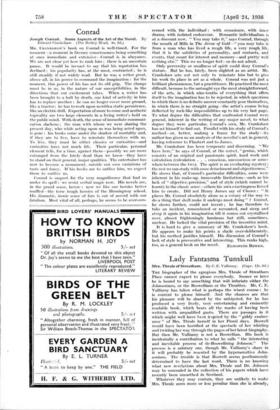Conrad
Joseph Conrad. Some Aspects of the Art of the Novel. By Edward Crankshaw. (The Lindley Head, 8s. 6ds)- Mn. CRANKSHAW'S. book on Conrad is well-timed.. For the moment—a moment in literary consciousness being something at once immediate and extensive—Conrad is in abeyance. We are not clear yet how to rank him ; there is an uncertain pause. It would be inexact to say that his reputation has declined ; his popularity has, at the most, contracted ; he is still steadily if not widely read. But he was a writer great, above all, in his power to command the imagination : for the moment, this power of his has not its old grip. The change must be in us, in the nature of our susceptibilities, in the directions that our excitement takes. When a writer has been brought to a halt by death, one kind of activity in him has to replace another : he can no longer cover more ground, like a tractor; he has to work upon us with a static persistence, like an electric drill. Expectation of more to come and aesthetic topicality are two large elements in a living writer's hold on the public mind. With death, the sense of immediate communi- cation slackens ; the man with whom we were sharing the present day, who while acting upon us was being acted upon, is gone : his books come under the shadow of mortality and, if they are to live, have to reinstate themselves with us. To live, they must be either classics or curiosities—and curiosities have not much life. Their particular, personal element tells, for a time, against them—possibly we are more estranged from the lately dead than we know—they have to stand on their general, major qualities. The entertainer has now to become a monument, outside our own variations of taste and fancy. If his books are to outlive him, we expect them to outlive us.
Conrad is suspect for the very magnificence that had us under its spell : we resist verbal magic now. His novels are, in the grand sense, heroic : now we like our heroics better muffled—the terse tough heroics of the Hemingway school. His dramatic, ironic sense of fate is out of accord with our fatalism. Most vital of all, perhaps, he seems to be over-con- cemed with the individual : with conscienee, with inner drama, with isolated endeavour. Romantic individualism is at a discount now. "You may take it," says Conrad, through the mouth of Mills in The Arrow of Gold—" you may take it from a man who has lived a rough life, a very rough life, that it is the subtleties of personality, and contacts, and events, that count for interest and memory—and pretty well nothing elae:7 This we no longer feel—or do not admit.
Only perversity or smallness of spirit could deny Conrad's stature. But he has, lately, been slighted as an artist Mr. Crankshaw sets out not only to reinstate him but to give his work its place in art as a whole. Conrad was not just a brilliant phenomenon, but a practitioner. He practised the most difficult, because to the untaught eye the most straightforward, of the arts, in which nine-tenths of everything that offers itself to the imagination has to be rejected, in which questions to which there is no definite answer constantly pose themselves, in which there is no straight going—the artist's course being deflected by rock-like impossibilities up to his very last page. To what degree the difficulties that confronted Conrad were general, inherent in the writing of any major novel, to what degree they were particular, Conrad's own, Mr. Crankshaw has set himself to find out. Parallel with his study of Conrad's method—or, better, making a frame for the study—its author has given us an analysis of the novelist's art in general, having reference to Flaubert and to James.
Mr. Crankshaw has been temperate and discerning. "We have here," he says of Conrad, at the outset, "genius, which consists of an original and passionate spirit, hard work and calculation (calculation . . . conscious, unconscious or some- where between the two). The spirit is an everlasting mystery; the rest we can study with some detachment and objectiveness." He shows that, of Conrad's particular difficulties, some were inherent in his make-up, immovable limitations—such as his lack of "objective, precision,'" and of style (which cannot be learnt) in the classic sense—others his own exactingness forced him to create.. Did not Henry James say of Chance : "It places Mr. Conrad absolutely alone as a votary of the way to do a thing that shall make it undergo most doing " ? Conrad, he showa further, could not invent he has therefore to take an incident, remembered or recounted, and steep and steep it again in his imagination till it comes out crystallised over, almost frighteningly luminous but still, sometimes, unclear. He lacked the vital precision of the inventive mind.
It is hard to ,give a summary of Mr. Crankshaw's book. He appears to make This points . a shade over-deliberately, but his method justifies himself. His discussion of Conrad's lack of style is provocative and interesting. This ranks high, too, as a general book on the novel.
ELIZABETH' BOWEIC


















































 Previous page
Previous page